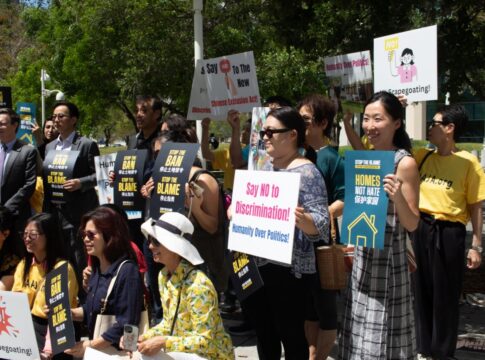 A report last month from NPR on a study which found university professors discriminated when choosing who to mentor sparked quite a lot of interest (photo by University of Salford).
A report last month from NPR on a study which found university professors discriminated when choosing who to mentor sparked quite a lot of interest (photo by University of Salford).
A piece written in today’s NY Times by the authors of the study shed more details about the experiment.
As we mentioned last month, researchers sent emails seeking advice and mentoring to 6,500 university professors from students with names most people would associate with particular ethnic groups and genders.
The study found that white males were more likely to get a response than women and minorities.
The study also found that Indian Americans and Chinese Americans were the most likely to be discriminated against despite the model minority stereotype.
LATEST STORIES
Now we’re learning this discrimination took place across almost every discipline and in all types of universities.
Perhaps equally disturbing is the bias took place even if someone emailed a professor from the same ethnic group or the same gender.
The only exception to that appeared to be when Chinese students emailed Chinese professors.
This discrimination also took place even when professors from diverse disciplines were emailed. There seems to be no difference in the level of discrimination between diverse disciplines or less diverse disciplines.
Underrepresented applicants also didn’t enjoy any advantage when seeking mentors. In other words, there’s no hidden advantage to being a minority or women.
The authors of the study did not explain why they think this bias takes place. What are your thoughts?
Does any of this surprise you?








New details released of racial and sexual discrimination of University professors: http://www.nytimes.com/2014/05/11/opinion/sunday/…
This is the address to the NY Times op-ed mentioned above (post links to the wrong page).
As for my reaction… no, I’m not surprised by the conclusions drawn from the study, but I am interested that folks are genuinely worried about the racial/sexual discrimination experienced by women and minorities in higher ed to the extent that “[they] are a little chastened”. The piece notes that Chinese students writing to Chinese professors may be an exception to the observation that reaching out to someone of the same gender or race does not reduce bias. In my experience as an engineering student, many of the engineering students under the mentorship of Chinese professors are international students too.
One of the first concerns of international students is to clear their status as a legal person in the country (students visas, H-1B, green cards, etc). Furthermore, doctoral engineering students are expected to work long, arduous hours to complete the required experiments, papers, conferences, misc work generally set by the advising professor. If English is their second language, they will also need to spend time to improve their English that is needed in doing research, taking classes, and everyday communication (although, this situation seems to have improved tremendously since the days when my parents were college grads). Many of the Chinese doctoral students that I know were also moms and dads, whom had to struggle to make time for their kids (e.g. sending and picking up their kids to and from school, working out which parent stays at home in the afternoon to look after the kids if there was no extended family members to do the work, planning some sort of leisure time where the family can come together to relax and bond, etc). Perhaps due to their own experiences as international students, Chinese professors are more likely to respond to Chinese students because their shared experiences of exploitation and racial/sexual discrimination and the continuing need for that exploitation within the racial/sexual environment in order to further everyone’s careers.
Going back to the study, one of the conclusions was that “Chinese students were the most discriminated-against group in our sample”. I would argue that the underlying model minority myth that stereotypes Asians as a hard-working, meritorious racial group serves two purposes: 1) it provides a seemingly innocuous explanation to a so-called “Asian success” within academia, and 2) it obscures the institutional and historical discrimination of women and minorities in higher ed, which itself is closely associated with business and political entities (“the real world” as the saying goes”). As a casual observer, I do not see things changing (systemically) any time soon, and especially not if Americans in general are only slightly “chastened,” college students like the Chinese students whom I know are crazy busy struggling to live and better their lives, and institutions are more interested in taking care of business as usual than doing what is fair. Like I alluded to before, getting into college, even a prestigious one at that, does not guarantee our success in life: it is still our personal duty to realize the opportunities no matter how small or difficult.